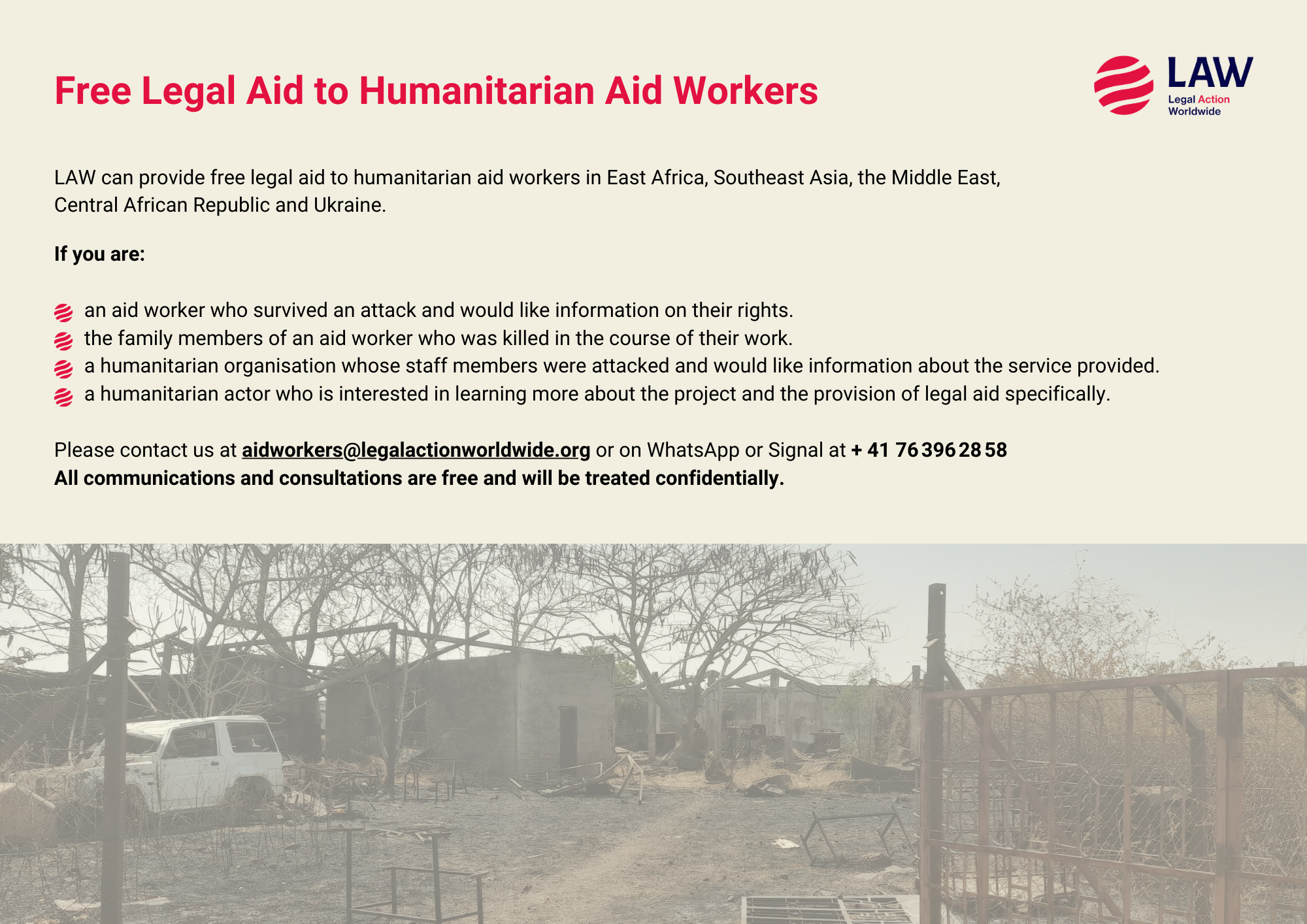Atrocities Against Aid Workers
LAW condemns the increase in deliberate and targeted attacks on aid workers in recent years and the very high rates of impunity for these attacks. Very few perpetrators are being held accountable and there are virtually no prosecutions. Very few aid workers receive legal advice about the range of options to pursue justice and accountability. Just a few organisations are equipped to support their staff to pursue legal action, which is often viewed as too challenging and unlikely to succeed.
All-time High Aid Worker Casualties in 2023
444
Victims of violence
235
Aid workers attacked
116
Aid workers killed
185
Aid workers kidnapped
143
Aid workers injured
Trend of Attacks
Overall, attacks against aid workers were marginally lower in 2022, but there was a significant surge in kidnappings.
South Sudan remained the most dangerous operational context for humanitarian workers, with Haiti and Ukraine newly joining the group of countries with the highest number of incidents
Another notable trend in 2022 was the continued rise in casualties borne by national and local aid organisations. Despite having far larger staffs, international NGOs have seen a decrease in attacks, while those of their local partners are on the rise.
Humanitarian Outcomes.(2023). Figures at a Glance. July, https://www.humanitarianoutcomes.org/figures_at_a_glance_2023
In 2023, the conflicts in Sudan and Gaza added these two contexts in the list of the most dangerous operational contexts for aid workers. In the history of UN, Gaza has been the conflict were most UN staff was killed, counting more than 100 deaths within a little more than a month of conflict.
Impunity of Atrocities Against Aid Workers
The trends in violence against humanitarian personnel have accelerated over the last 20 years with very little or no legal responses, resulting in almost total impunity for atrocities against aid workers. The international response has focused mainly on security council resolutions, condemnations, and expressions of outrage with very little impact in real terms as the number of attacks on aid workers continue to increase, with virtually no accountability.
As well as low prosecution rates, the rate of reporting is alarmingly low. Humanitarian aid worker victims and survivors have been reluctant to pursue cases for a range of reasons, including a lack of advice and support, limited financial capacity, security risks (actual and perceived), and deeply ingrained perceptions that it is not possible to achieve any form of justice or accountability.
It is imperative that the gaps in the system are addressed, and that humanitarian aid workers receive the same protection of the law, and access to justice, that the humanitarian system strives to ensure for the communities it works for.
How is LAW Responding?
France, supported by the European Union, launched a discussion series in the run-up to the Security Council debate on the issue of attacks against humanitarian workers in July 2021. LAW was invited to speak about addressing impunity through legal mechanisms in the Security Council debate about humanitarian space and protection. In the Outcome Document, the first key recommendation states that all attacks should be investigated, accountability strengthened, and existing impunity addressed.
In March 2021, LAW was invited to speak at the Global INGO security Forum conference on humanitarian space and protection. LAW facilitated three break-out rooms that were attended by staff from a wide range of large, mid-sized and small international NGOs. LAW presented the various options that could be open to humanitarian staff and sought feedback from INGO managers as to why organisations do not support their staff to pursue legal cases domestically or internationally.
Since November 2022, LAW with the support of the French Ministry of Foreign Affairs (CDCS) is implementing a ground breaking project providing legal aid to national staff of national and international NGOs that have been victims of attacks. The project aims to address the gap in the provision of legal support to aid workers and to raise awareness among the humanitarian community on the avenues available to Access justice. Furthermore, LAW has been engaging in in-depth research on what are the barriers that prevent aid workers and organizations for reporting and addressing the attacks through legal avenues. This research includes consultations with key humanitarian actors, including the UN, humanitarian donors and NGOs. The findings will feed a report that will be published in the first half of 2024.

